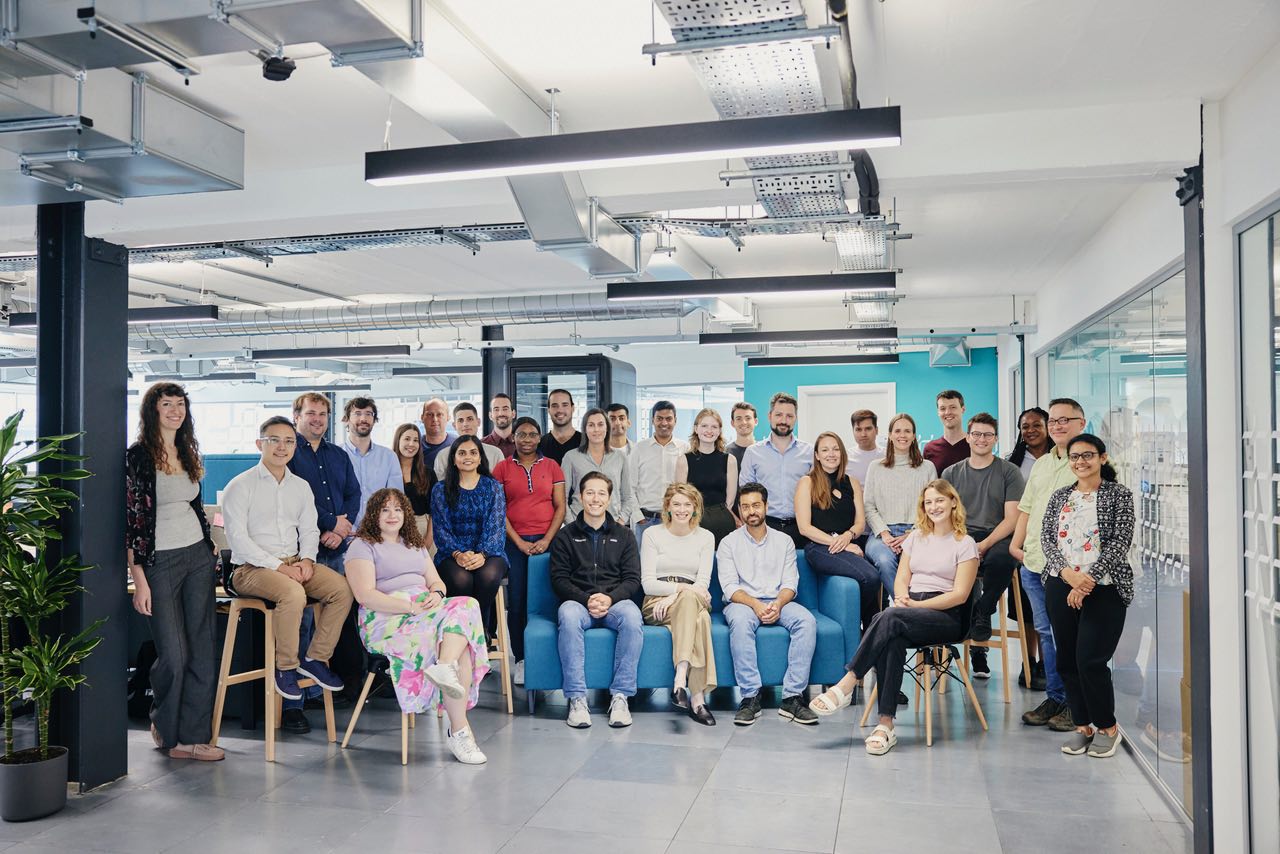When researchers revealed the results of a study on the prevalence of microplastics in human placentas earlier this year, the findings were profoundly disturbing. Researchers analysed 62 placental tissue samples — and found microplastics in all of them.
In the words of the lead author of the study, “If we are seeing effects on placentas, then all mammalian life on this planet could be impacted.”
The world desperately needs to quit its addiction to fossil-based fuels and other fossil-based chemicals, for the sake of both planetary and human health (which are inextricably linked). This is where synthetic biology, or synbio, could have a significant part to play.
Imagine a world where we could replace every single harmful synthetic chemical and fossil-based plastic with entirely natural and biodegradable compounds. This would translate to less loss of biodiversity, fewer greenhouse gas emissions — and fewer microplastics floating around in our bloodstreams. Companies like FabricNano are trying to make this a reality.
The beauty of biology
Many startup founders want to believe that they are on to the next big thing in tech. (I have lost count of all the “revolutionary” and “groundbreaking” promises in press releases, mostly with little regard for the actual definitions of the words.)
But every now and then, there are startups that could actually boast such descriptions of their technology. FabricNano not only wants to help us consciously decouple from our toxic relationship to plastics, but transform the chemical industry as a whole — one cell-free biobased enzyme at a time.
“If you walk into a forest, you see trees — there’s bark, there’s leaves, there’s all these materials. When you look at your own body, you see soft skin, you see delicate hair, but also very hard nails. All of these materials come from biology, and are manufactured from chemicals,” Grant Aarons, FabricNano’s founder and CEO, tells TNW.
Getting rid of the biotech ‘factories’
The chemicals Aarons refers to are made in cells — human skin cells, plant cells, etc. The materials they produce are the result of a transformation of an input chemical to a different chemical, via proteins inside of the cell.
The first version of synthetic biology and biomanufacturing was getting cells like yeast to take sugar and instead of producing alcohol on the other side, changing some of the proteins inside so that they take the sugar and they make a plastic instead.
Cell-based biomanufacturing uses living cells as factories to produce biologically active products, for instance pharmaceuticals, chemicals, enzymes, and other biomolecules. While a cornerstone of the biotech industry, it is susceptible to contamination, and requires precise control of growth conditions to ensure cell health, productivity, and genetic stability.


It is also expensive, and different enzymes of the cell can compete with each other for energy. But when taking the enzymes out of the cells, the reactions and productions can still proceed, which means that the living microbial factories are not always necessary.
“In fact, enzymes that are taken out of the cell can do the job at conditions where any cell would have ceased to do anything, such as high temperatures, in the presence of toxic compounds, or under extreme pH,” Dr Volker Sieber, professor of chemistry of biogenic resources at the Technical University of Munich, explains via email.
It is also easier to engineer an enzyme to make it fit for the task at hand than it is to engineer an entire microorganism, Dr Sieber adds.
Elegant but ephemeral enzyme machinery
Extracting the enzymes from the cells to do chemistry is means you are doing cell-free biomanufacturing, as you are no longer using the cells — only the protein.
“The beauty of nature is that we have trillions of proteins,” Aarons says. Each of these proteins can take a very unique starting molecule and convert it to a different outcome molecule. Aarons describes them as “a very elegant and evolved machinery that can do pretty much any transformation you can imagine, using bio-based input.”
However, proteins are incredibly perishable. Once you pump it outside of a cell, it is viable for about one hour. Then it unravels and loses both its three-dimensional shape and its function.
Considering that it costs around $100 to extract one kilogram of protein for such a limited period of use, the technology has not been viable on an industrial scale. This is where FabricNano comes in.
Protein immobilisation
The company’s technology takes a protein that’s sitting outside of the cell and, instead of a mere hour, makes it last for half a year, using a process called protein immobilisation.
“We take proteins like processors or transistors — imagine like in the semiconductor world — and we put them on top of a surface. If we bind them in just the right way, they sit on the surface and they keep doing their function, and they last for six months before they actually fall apart,” Aarons says.
The tricky bit, Aarons adds, is finding the right surface to match with the right protein to create these “biocatalysts.” To do that, FabricNano studies data points from “hundreds of thousands of proteins on different physical materials — things that look like beads, glass, coffee beans, anything you can imagine that is big and circular.”
The company then runs the data points through an AI model that tells it how to connect the pieces.
Journey to market
There are some clear early commercial applications. For instance, bioplastics from tree bark, cellulose, and lignin and biodiesel from vegetable oils. However, according to Aarons, “almost everything is on the table.”
This includes commodity chemicals, fuels, plastics, drugs, and different healthy sugars for better foodstuffs. “You can name pretty much anything under the sun, and I’ll tell you it’s possible with biology. But it doesn’t work unless that protein lasts long enough. And so we solve this stability problem, this robustness problem.”
But the process is not a quick solution. FabricNano builds its products bespoke and from scratch, which means that the startup sometimes needs to go on what Aarons describes as a five-year journey with a chemical company.


Where the startup could have more impact early is where it could service a ready market today. One example is longer-lasting enzymes used in washing detergents, which means more bio-based instead of petroleum-based products, and less powder needed for the same degree of stain-removal capacity.
According to Insight Ace Analytics, the next-generation biomanufacturing market was valued at $22.76bn last year, and is predicted to hit $48.27bn by 2031. FabricNano, founded in 2018, has thus far raised just under $25mn, with funds from, among others, VC firm Atomico and celebrity angel investor Emma Watson.
The company currently employs 30 people, many of whom work in its lab facilities in Euston, London. While Aarons believes there is much more biotech talent in London than pretty much anywhere else in the world, it has not been as specialised as in most established biotech hubs, for instance the pharma-heavy area around Boston in the US.
The importance of a shared deeptech vision
Aarons is bullish about the potential impact of his startup’s technology. Professor Sieber would agree, confirming that using cell-free enzymes, either free in solution or immobilised for higher process stability and reusability like FabricNano, for biomanufacturing holds “great promise.”
While FabricNano is working on chemical synthesis with big corporations, the closer-term projects are consumer products, and other means of contributing to environmental solutions — such as bio-based carbon sequestration through enhanced rock weathering, or ERW.


Hearing the FabricNano CEO speak you’d think he was a biologist or chemist by trade. But Aarons began his career working at the Federal Reserve in New York. When he came to the UK to do a PhD in econometrics, he first wanted to found a fintech company. However, he says, he couldn’t find anyone who really wanted to work on it.
Then, he learned about biology and cell-free biotechnology, which was where he “could see that the world was lighting up,” and that people were interested in working on this specific problem.
“I think that can’t be overstated when you’re thinking about starting a very difficult deeptech company. Does the vision actually resonate with all your employees and your customers?”






